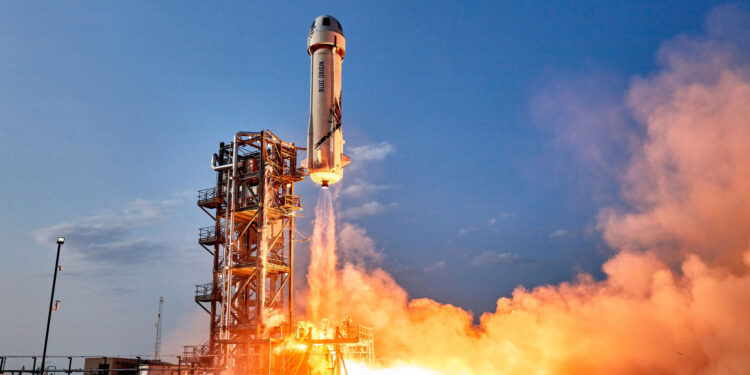Blue Origin is developing plans to scale its New Shepard suborbital space program to weekly launches by adding three next-generation vehicles and potentially establishing a second launch site outside the United States.
Phil Joyce, Blue Origin’s senior vice president for New Shepard, outlined expansion plans during the Global Spaceport Alliance’s International Spaceport Forum in Sydney, Australia, over the weekend. Aviation Week and SpaceNews reported his remarks.
“The demand is really strong,” Joyce said according to SpaceNews. “We’re continuing to see sales every week, every day.” The company’s backlog extends beyond one year.
Blue Origin will phase in three next-generation New Shepard rockets starting next year, powered by upgraded versions of the hydrogen-fueled BE-3 engine. The plan calls for retiring the two current reusable crew-carrying vehicles by late 2027.
Since 2015, Blue Origin has operated New Shepard suborbital spacecraft from Launch Site One in West Texas. The first 15 flights were uncrewed, leading to the inaugural crewed flight with founder Jeff Bezos aboard in 2021. Since then, the company has sent 75 people on suborbital trips, with five individuals flying multiple times.
Blue Origin launched nine New Shepard missions over the past year, six carrying crew. Joyce indicated that weekly flights would reach Launch Site One’s capacity, prompting consideration of a second location.
“We are trying to find a partner that is willing to invest,” Joyce said according to Aviation Week. The new site could be located internationally based on customer convenience considerations.
“A lot of our target customer base, ultra-high net worth individuals, don’t want to spend a day and a half getting to the destination, so that’s a consideration,” Joyce said according to SpaceNews.
Blue Origin has not disclosed ticket prices, though crypto billionaire Justin Sun bid $28 million during a 2021 auction for a seat on the first crewed flight. Sun completed his space trip last month.
The expansion plans reflect growing commercial space tourism demand as multiple companies compete to offer suborbital and orbital experiences to paying customers. Blue Origin’s New Shepard program competes with Virgin Galactic’s SpaceShipTwo system in the suborbital tourism market.
Weekly launch cadence would represent significant operational scaling for Blue Origin, requiring streamlined vehicle turnaround processes and expanded ground support infrastructure.







